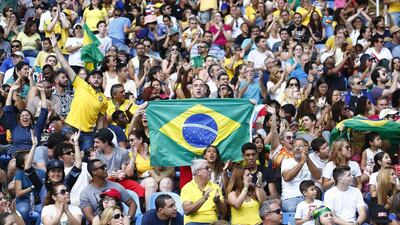The scene inside the Maria Lenk Aquatics Centre brought an International Paralympic Committee (IPC) official to tears.
For the two weeks between the end of last month’s Olympic Games and the start of the ongoing Paralympics, fears had steadily grown regarding tickets sales.
Yet it was not the sight of an empty stadium that prompted the IPC’s Craig Spence to reveal he had “tears streaming down my face”.
The Paralympics spokesman was inside an almost sold-out arena when Daniel Dias won gold in the 200-metre freestyle on the opening night of action.
It was the Brazilian swimmer’s 16th Paralympics medal and the crowd, Spence tweeted, erupted “like nothing I have ever witnessed”.
It was a remarkable turnaround for an event that only a few weeks ago had shifted just 12 per cent of the allocated 2.5 million tickets, despite some packages costing as little as 10 reals (Dh11).
Slow sales had prompted Greg Nugent, the former London 2012 marketing director, to launch #FillTheSeats, a crowdfunding campaign aimed at raising US$300,000 (Dh1.1m), enough to send 10,000 underprivileged Brazilian children to the Paralympic Games.
“These are kids that would definitely never had gone to the Games if it were not for the generosity of the world,” Nugent said after hitting the target by only the second day of competition.
“First and foremost I hope they love the sport, but more than that I hope they leave with a different view of what they can achieve.”
More from the Rio 2016 Paralympics:
• UAE: Shooter Abdullah Sultan Al Aryani wins second silver medal
• UAE: Nervous butterflies belie Zenab Al Breiki's contagious smile
• Gallery: Amazing pictures from the Paralympic Games
Unlike some stage-managed campaigns, the success of #FillTheSeats appears to have been its organic origins.
Nugent’s initial target was merely $1,000, but having raised those funds easily, he upped it to $15,000, which would have been enough to send 500 children to the Games.
US Paralympians Tatyana and Hannah McFadden were the first to donate, but it was only when British musicians Coldplay, who played at the Closing Ceremony of the London Paralympics, tweeted their support of the campaign, that #FillTheSeats exploded into life.
A couple of days later, the United Kingdom’s Prince Harry made a personal donation and several major multinationals including Sainsbury’s and Allianz followed suit.
“The support the campaign has generated has been really quite amazing,” the 12-time Paralympics medallist Tatyana McFadden said. “When I started aged 15 nobody knew about the Paralympic movement.
“Now I am 27 and the situation has just changed so much.
“It’s very humbling and makes me excited to compete not just for me and my country, but for the people.”
The campaign has also helped generate more local interest with tickets sales rising considerably in the past week.
On Saturday, 170,000 were sold for events at the Olympic Park, a figure that surpassed the one-day total for some days of the Rio Olympics.
The total number of tickets now sold exceeds 1.8 million, surpassing the 1.7 million sold in Beijing and making Brazil the second highest-selling Paralympics in history.
“What we are seeing is genuine support and interest among Brazilians in the Paralympics,” Rio 2016 communications director Mario Andrada said. “The Fill The Seats campaign is a beautiful way to be a part of the Games and goes way beyond finding tickets for underprivileged kids.
“It’s about being there to help, even if you are not physically there.”
When asked, given that the campaign originated in the United Kingdom, whether it felt a little like Brazil was being treated like a charity case, Andrada dismissed the theory.
“Of course, we would have been proud if it had been a Brazilian-sourced campaign, but we are sure that Brazilians contribute to the campaign abroad,” he said.
“It’s a global campaign and we welcome the support of people because it sets a good example. A crowd doing things is very encouraging for the future of humanity.
“Whether it is crowd-sourcing, crowd-cleaning, a crowd-playing games, whatever … united we can do so much more.
“We are honoured to be part of this campaign.”
Andrada also cited the recent sitting volleyball team event between the United States and Algeria as an example of the supportive spirit at Rio.
When the African nation failed to show for their match, IPC officials invited children on to the court to play.
The majority of the crowd remained to cheer on the youths.
“The fans could have gone,” Andrada said. “There weren’t any high-ranking athletes playing. Only children.
“But 8,000 people decided to stay and cheer on the kids as they learned the sport.”
Follow us on Twitter @NatSportUAE
Like us on Facebook at facebook.com/TheNationalSport

